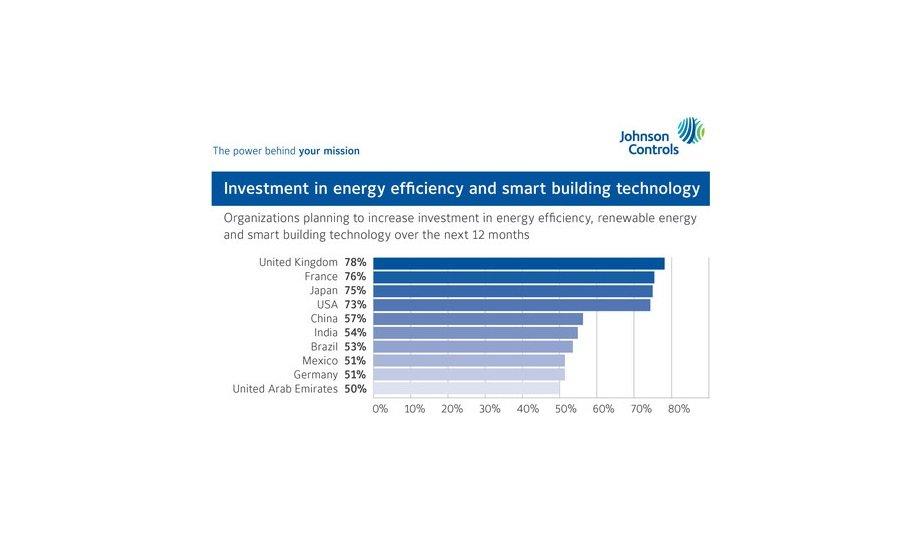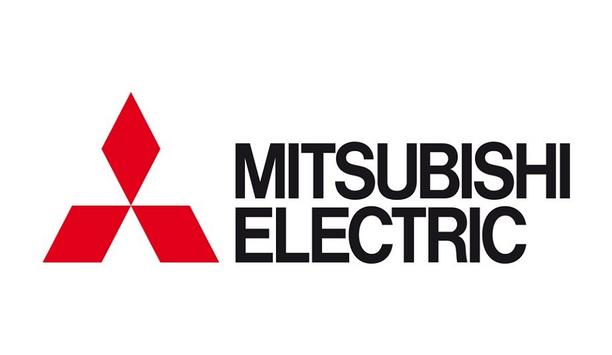Johnson Controls, the pioneer for smart, healthy, and sustainable buildings, announces findings from the 15th annual Energy Efficiency Indicator Survey, which revealed that 62 percent of organizations surveyed expect to increase investments in energy efficiency, renewable energy, or smart building technology in 2022, indicating a return to pre-pandemic levels.
The latest report by the United Nations Intergovernmental Panel on Climate Change advised that global-scale transformation is urgently needed to combat climate change, however, the Johnson Controls Energy Efficiency Indicator Survey found that organizations are still facing challenges to accelerate their sustainability efforts in key areas.
Scale sustainability initiatives
Almost two-thirds of survey respondents say they struggle to scale sustainability initiatives across buildings, geographies, or business units.
Almost two-thirds of survey respondents say they struggle to scale sustainability initiatives across buildings
"In the face of the multiple and continuous shock waves of the last two years, it is very encouraging to see that building owners and operators are driving forward the kinds of investments that deliver the resilience needed to grow their business and attract and retain the best talent," said Katie McGinty, Vice President & chief sustainability and external relations officer at Johnson Controls.
Destructive natural events
"Whether it is the damage delivered by climate-charged destructive natural events, or the health threat of the pandemic, or now, the stark demonstration of the insecurity of world energy supplies, it is clear that taking action to cut energy demand while decarbonizing and cleaning the air are core strategies for companies, governments, and institutions to not only survive but to thrive.”
“Our innovative technologies in heat pumps and our OpenBlue digital platform, plus our Net Zero as a Service partnership offering, are exactly the right tools at the right time for leaders determined to stay well ahead of challenges and deliver new opportunities for their business or organization."
Electric energy storage
More than half of the respondents implemented electric energy storage in the past year
The survey revealed that planned investment in energy generation or storage has grown significantly over five years, likely in response to the global focus on decarbonization, and as part of that effort, electrification. More than a third of respondents plan to replace fossil fuel heating equipment with heat pump technology in the next year, which is 7 percent more than what was implemented in the year prior. Notably, thermal energy storage jumped from 27 percent to 42 percent in the last five years. More than half of the respondents implemented electric energy storage in the past year.
The survey also found that the United States and Europe still lead the way in every metric of green building planning. The U.S. had the most respondents who had already achieved green building certification and expect to have a net-zero energy or carbon building in the next ten years.
Carbon reduction goals
Europe had the most respondents planning to attain green building certifications and the most respondents who have established public energy/carbon reduction goals, with the UK leading with 46 percent established goals.
Europe had the most respondents planning to attain green building certifications
Compared to its global counterparts, significantly more respondents in the U.S. plan to implement measures such as building controls improvements, onsite renewable energy, and energy management process such as ISO 50001. Of the countries surveyed, the U.K., France, and Japan have the most respondents who expect to increase investment in energy efficiency, renewable energy, or smart building technology over the next year. Still, to reach global sustainability and environmental goals, the world must work collectively to plan for a more energy-efficient future and make investments today for the generations to come.
Pursuing sustainability initiatives
Although global-scale transformation is necessary to course-correct on climate change, organizations are facing barriers to pursuing sustainability initiatives. Almost half of the respondents surveyed say their top barrier to pursue energy and building technology improvements is either a lack of funding to pay for improvements (25 percent) or uncertainty in their return on investment (23 percent).
Additionally, more than half of respondents pointed to a lack of technology as one of the hindrances to scaling sustainability efforts. Globally, these top barriers have remained largely the same as they were five years ago, underscoring the opportunity to catalyze accelerated action through innovative solutions like Johnson Controls' Net Zero as a Service that enables decarbonization with no upfront capital and with reduced operating expenses as well.
Decision-Making factors
Over the next 12 months, almost 60 percent of organizations plan to invest in fire/life safety systems
The pandemic has also prompted organizations to rethink their technology investment decision-making. Protecting the health and safety of building occupants during the coronavirus pandemic was the second most significant driver of investments globally. Additionally, 65 percent of respondents performed an indoor air quality assessment last year.
Respondents also said improving occupant health and wellness overall and improving life safety and security were important decision-making factors. Over the next 12 months, almost 60 percent of organizations plan to invest in fire/life safety systems and security system improvements to their buildings. Long term, more than two-thirds of organizations believe data analytics and cybersecurity will have an extremely or very significant impact on the implementation of smart buildings over the next five years.
Improving energy efficiency
The survey revealed that actionable policies are also important for progressing energy efficiency goals. 85 and 72 percent of respondents, respectively, reported that performance benchmarking/certifications and performance standards for energy codes are critical to improving energy efficiency efforts.
The Johnson Controls Energy Efficiency Indicator Survey collected responses from 1,000 participants globally between November and December 2021.

















